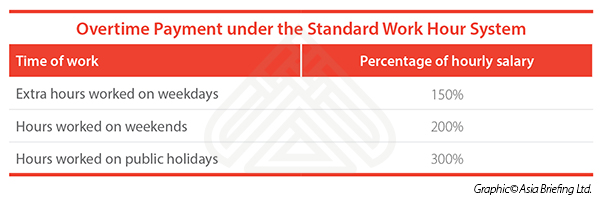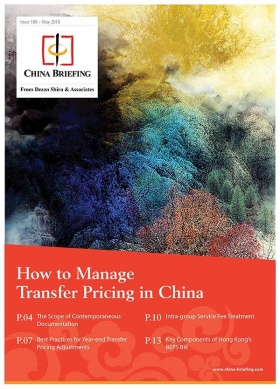Work Hour Systems in China
By Hugo Butcher Piat
Work hour systems define specific work hours, rest periods, and overtime rates for employees. In China, there are three main work hour systems: the standard work hour system, the comprehensive work hour system, and the non-fixed (flexible) work hour system.
The latter two systems are considered “special work hour systems”, which require special approval and compliance requirements. Compliance with these regulations is essential to correctly maintain payroll expenses and avoid unnecessary costs that could arise, including potentially damaging labor disputes.
Employers should therefore acquaint themselves with the different work hour systems in China, identify which suits their business best, and take the appropriate steps to comply with local labor regulations.
The standard work hour system
The standard work hour system requires that an employee’s work day is not more than eight hours and an average work week is not more than 40 hours. Most white-collar jobs in China currently operate according to this system, which equates to a five-day work week, although some domestic companies institute six-day work weeks.
Workers shall be afforded at least one rest day per week. Working hours are subject to the usual overtime rates:
- For overtime work, not less than 150 percent of the normal wage shall be paid;
- For work on a rest day, and where such rest days cannot be postponed and taken at another time, not less than 200 percent of the normal wage shall be paid;
- For work on an official public holiday, not less than 300 percent of the normal wage shall be paid.
The standard work hour system is suitable for most types of jobs in China.
![]() RELATED: Structuring a Salary Package in China
RELATED: Structuring a Salary Package in China
The comprehensive work hour system
The comprehensive work hour system accumulates work hours over a specified cycle (weekly, monthly, quarterly, or yearly). The average number of hours is then determined based on this accumulation period. Broadly speaking, this system is most suited to work roles with irregular shifts, including seasonal or project-based work.
Overtime is applicable for hours worked above the standard set per cycle. Such rates match those of the standard work hour system for extra hours worked and work on public holidays. However, no rest day is outlined under this system.
Before a company can implement this system, it must first submit its plan to the local labor bureau and get approval.
The following types of employees and industries are most suited to this system:
- Employees who are required for continuous operations due to the special natures of their jobs, such as work related to transportation, aviation, railway, shipping, fishing, postal and telecommunications service industries, electric power, petroleum, petrochemical, and finance industries;
- Seasonal workers and those subject to natural constraints, such as in the mining, construction, salt production, sugar production, and tourism industries; and
- Other employees with similar work roles may be suited to the comprehensive work hour system “in accordance with the industry policies issued by the State Council with respect to encouraged or promoted industries, the positions that the PRC Ministry of Human Resources and Social Security deems eligible for implementation of the Comprehensive Working Hours System.”
Once this system is in place, the employee’s work hours will be calculated over a “comprehensive calculation period” (e.g. weekly, monthly, quarterly, or yearly). In contrast to the standard work hour system, employees on this system may work for up to 36 hours more before overtime rates apply. This system is employer-friendly because local labor bureaus will define the upper limits for employee’s monthly work hours.
The non-fixed (flexible) work hour system
The non-fixed work hour system accommodates employees whose working hours are impractical to measure. Employees on such a work hour system will generally be paid as a salaried employee. This salary is a set amount paid per period, often monthly in China.
No overtime cost is associated with the non-fixed work hour system. Employers are required to observe appropriate work and rest schedules, though it is ultimately up to the employer’s discretion.
This type of work hour system and payment method makes sense when outcomes trump specific hours spent at work. Such roles include:
- Senior management;
- Salespeople; and
- Employees in the transport, warehousing, and railway sectors.
Non-fixed working hours cannot be applied to employees in low-level management or non-management roles unless they fall under one of the following work roles:
- Off-site sales personnel;
- Personnel permanently based out of town;
- Long distance transportation personnel;
- Non-production on-duty personnel; or
- Others in special work positions that may arrange their own work and rest schedules.
Again, local labor bureau approval is required prior to implementation. Be wary that every Chinese city tends to differ on the requirements for gaining this permission. Two distinct examples of this are Beijing and Shanghai.
Beijing, for example, allows senior management to undertake the non-fixed working hour system without the need for approval. In this case, the question then arises as to which staff are considered “senior management”. To determine this, a reference of the company’s Articles of Association, which lists the “senior” staff’s details, should suffice.
Shanghai, on the other hand, requires permission prior to allowing staff to engage in the non-fixed work hour system. In addition to this, one day per work week must still be provided, as with the standard work hour system. So, contacting the relevant authority in the applicant company’s district of their city will provide the most accurate requirements.
![]() RELATED: A Complete Guide to 2017 Minimum Wage Levels Across China
RELATED: A Complete Guide to 2017 Minimum Wage Levels Across China
How to get approval for the special work hour system
Before implementing a special work hour system, be it a comprehensive or non-fixed work hour system, the employer must usually obtain written permission. The local labor bureau administers this process.
Two types of permission are generally required:
- General permission: this allows your company to implement the chosen special work hour system; and
- Specific permission: this is required for each relevant employee who shall work under the special work hour system.
Keep in mind that approval is required for the comprehensive work hour system in every case. As for the non-fixed work hour system, the need for permission is subject to local regulations. Therefore, it is best to confirm whether or not you will require permission with the local labor bureau.
If permission is required, employers must submit the following application materials:
- An application for the implementation of a special work hour system (both types) by employers, which must include:
- The functional characteristics of the positions (work types) for the special working hours system;
- The proposed work hours and rest periods;
- The number of employees involved; and
- The comprehensive calculation of the working hours system;
- Trade union opinion of the enterprise (copy of the “Trade Union Legal Person Qualification Certificate”). If the enterprise has not established a trade union organization, it shall provide a “staff meeting for the implementation of a special work hour system”, and the attending staff shall sign and confirm it;
- A copy of the employer’s business license; and
- Other materials required by relevant laws, regulations, or rules.
The labor bureau shall make a decision on the application within 20 business days of confirming receipt of the employer’s application form and materials for implementing a special work hour system.
Note that the required documents vary depending on the location. Further documentation may be required aside from that listed above.
Employers using a special work hour system will also be subject to supervisory inspections of the relevant work unit (i.e. your company) at intervals that regulators see fit. For employers who misuse the system, further inspections and penalties may become necessary.
For example, the lack of overtime provisions for non-fixed employees may tempt certain employers to overwork staff to cut costs and boost production. Employees, on the other hand, can counter this by arriving or leaving their place of work early. Both instances may be difficult to track due to irregular working hours.
![]() International Payroll & HR Solutions from Dezan Shira & Associates
International Payroll & HR Solutions from Dezan Shira & Associates
Further issues to consider
As mentioned above, the presiding jurisdiction over your company is key to determining the relevant permission required for implementing a special work hour systems. Labor law regulations generally vary even from district to district within a given city, making communication with the local labor bureau essential.
Note that your company must have been operating in China for a minimum of one year prior to applying to implement a special working hour system. New businesses must implement the standard work hour system for the first year of operation.
Further, once you have obtained permission to implement the special work hour system, the system can only be implemented for a limited period. This period can be one or two years and is dependent on the quality of your application materials.
For instance, if you justify to the labor bureau in your application documents the need for a two year implementation period for the work role in question, permission for a two year system may be granted. Likewise, if your justification does not suffice, a one year or perhaps no permission at all will be granted.
Special work hour permission is tied to the role, not the individual. As long as the individual in that role meets the role’s requirements, no further permission is required.
For example, an employer may obtain permission to employ a senior manager for two years on the non-fixed working hour system, but the senior manager leaves the role early. A new employee is then recruited to fill the senior manager role. This new employee does not then need to obtain permission for working under the non-fixed working hour system for the remainder of the two year period.
About Us
China Briefing is published by Asia Briefing, a subsidiary of Dezan Shira & Associates. We produce material for foreign investors throughout Asia, including ASEAN, India, Indonesia, Russia, the Silk Road, and Vietnam. For editorial matters please contact us here, and for a complimentary subscription to our products, please click here.
Dezan Shira & Associates is a full service practice in China, providing business intelligence, due diligence, legal, tax, accounting, IT, HR, payroll, and advisory services throughout the China and Asian region. For assistance with China business issues or investments into China, please contact us at china@dezshira.com or visit us at www.dezshira.com
- Previous Article Dongguan’s Incentives for Establishing Headquarters
- Next Article Guangdong’s Minimum Wages to Increase July 1







